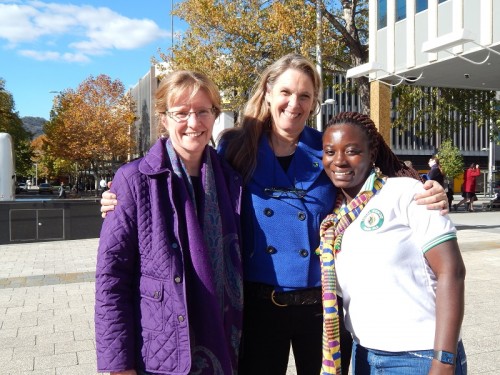GHANAIAN cocoa farmer Esther Mintah Ephraim had a lot of good things to say about Fairtrade when she spoke at the Legislative Assembly reception room this afternoon.

Lindsay & Edmunds director Michelle Fahy, Fairtrade Australia New Zealand CEO Molly Harisss Olson and Ghanaian cocoa farmer Esther Mintah Ephraim.
The lunchtime event, hosted by local (Fairtrade) chocolate maker Lindsay & Edmunds, promised a farmer’s perspective on what is behind the certification mark that appears on coffee, chocolate and various other products, assuring the buyer that whoever produced the raw product is not being ripped off.
But first we heard Greens MLA Shane Rattenbury’s perspective, that farmers should be paid fairly and work in fair conditions, followed by a CEO’s perspective, that of Fairtrade Australia & New Zealand head honcho Molly Harisss Olson, who lives in Gundaroo but commutes to Melbourne for work each week.
“We provide a minimum price, which takes the commodity risk out of their business so they can plan for the future, so we set a minimum price – if the price goes higher of course they get the higher price – but the minimum price is like a floor that they can have something solid to stand on,” Olson explained energetically.
“What we do on top of that is what we call the premium, and that’s the extra money that is given to the farmers and last year it amounted to about $8.5 million Euros, to help them invest in the community initiatives that they need to help their communities thrive and become more sustainable.”
Esther, 28, grows crops like plantains, cassava and cocoa on her family’s 38-hectare farm, and is one of more than 83,000 registered members of Kuapa Kokoo, a Fairtrade-certified cocoa cooperative.
She explained that the extra money from the Fairtrade premium was used by Kuapa Kokoo for development projects, such as skills training, education and healthcare, including helping her complete a tertiary course at the local polytechnic.
“Fair Trade really helps us a lot, especially with the women in the organisation,” Esther told the audience, explaining that the co-op elects leaders and makes decisions democratically.
“[...] We receive a premium from Fairtrade and then [Kuapa Kokoo] decided to use that to empower us by teaching us skills training. That is, how to prepare liquid soap… screen printing like what I’m wearing, then batik clothing.”
She said the money had also been used to provide farmers with tools they couldn’t otherwise afford, to provide schools and teachers to villages and access to clean water.
“At first in my community we were facing a very big water problem, like we were drinking from the river… and bathing there at the same time so as a result we were getting so many water borne diseases, so when the premium comes we normally decide and then look at some communities where they are facing problems and then provide some developmental projects.
“They considered my community and they provided a [hand-operated well] which enabled us to get potable drinking water and because of that we are no more facing the disease again, and we are very, very pleased with that.”
In 2008-09, Kuapa Kokoo sold 35,000 tonnes of cocoa, which included 9,500 tonnes, or 27 per cent, sold as Fairtrade cocoa. In 1999-2000, that figure was only 2.4 per cent.
The Fairtrade organisation uses money it raises from fees to use the logo to increase brand awareness, and therefore demand for Fairtrade products.
The post Why buy Fairtrade? Ask a farmer from Ghana appeared first on Canberra CityNews.